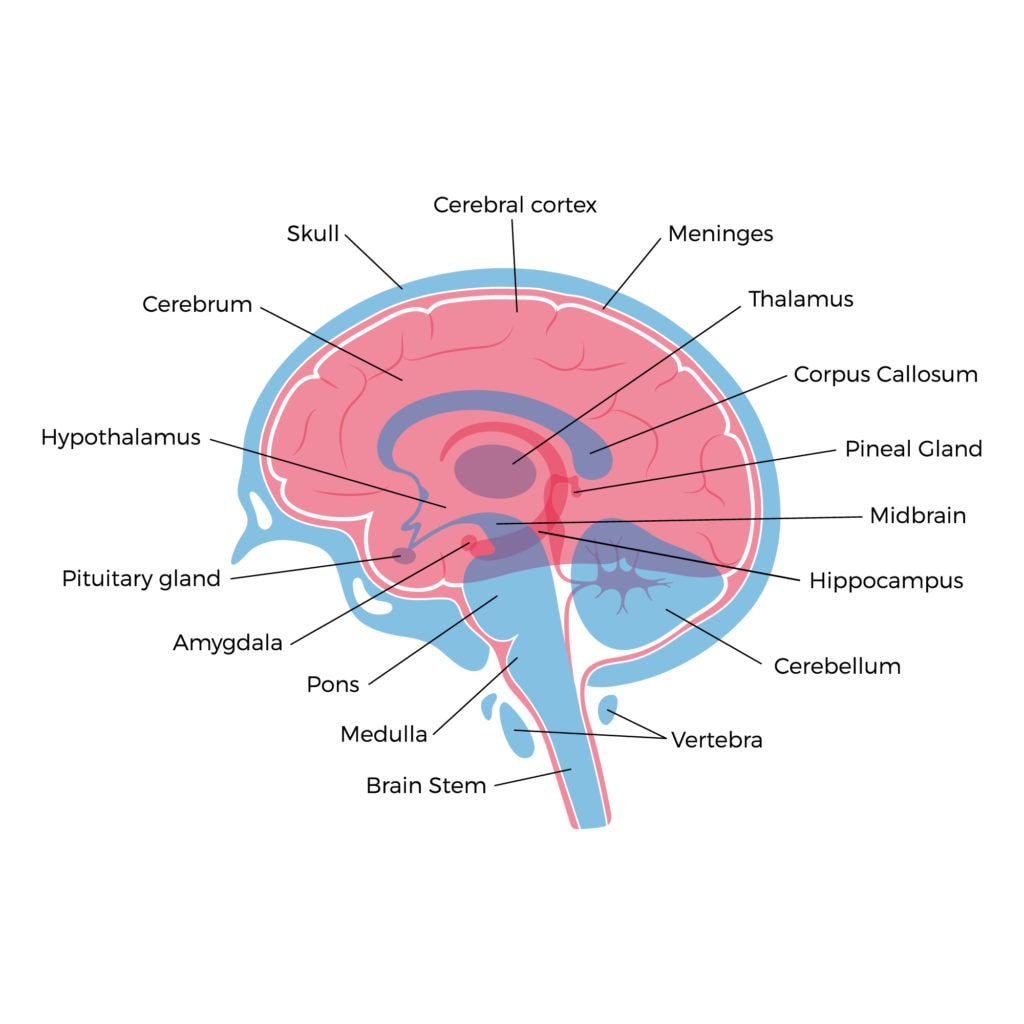Did you know the average brain weighs about three pounds? To be so light, it controls so much of daily life and is one of the most complex structures on the planet. Cerebral, or brain, disorders and conditions are common and can affect almost anyone. For example, in 2014, the Centers for Disease Control reported 2.87 million traumatic brain injuries, an increase of over 50% from the last survey in 2006. Because the brain is so complex, treatment of cerebral injuries and disorders require specialized care. Learn more about common disorders and neurosurgical treatment options.
What is the brain?
The brain is one of the most complex organs and controls much of the body. For example, it controls balance, coordination, senses, emotions, memory and more. Along with the spinal cord, it makes up the Central Nervous System, which controls most body functions. The nervous system sends signals from the head throughout the body, which allows movement, causes pain sensations and more.
The brain is made up of many parts. First, the skull, or cranium, is a bony structure that protects it and supports the face. Inside the skull, the largest structure is the cerebrum. The outermost part of the cerebrum is the cerebral cortex. The cortex gives the brain its pink, wrinkled texture that most people imagine when they think of the brain. The cerebrum has two hemispheres—commonly known as “left” and “right” brain. Then, these hemispheres are broken down into lobes or quarters, all responsible for different functions. The cerebellum, hypothalamus, stem and other important structures are in these lobes.
Inside the brain, neurons and glia help it function properly. Neurons are web-like structures that carry messages to different parts of the brain through electrical currents. The glia are cells that help protect the neurons.

Common brain disorders
Cerebral injury can occur from trauma or cerebral conditions. Some of the most common conditions are stroke, tumors and aneurysms. However, there are many cerebral conditions that may cause damage or require specialized neurosurgical care. Some of these disorders include:
- Brain tumors. A tumor is an abnormal mass in the brain or nearby tissue. There are many different types of tumors. These include acoustic neuroma, Chiari malformations, craniopharyngioma and pituitary tumors. These tumors can be cancerous—malignant—or noncancerous—benign.
- Cerebral aneurysm. A cerebral aneurysm occurs when an abnormal blood vessel growth occurs in the brain. The most common complication from aneurysms is rupture, which can cause bleeding.
- Stroke. When the brain is deprived of normal blood flow and oxygen, a stroke can occur. Stroke symptoms typically include difficulty speaking and understanding and loss of feeling in the face, arm or leg.
- Arteriovenous malformation (AVM). An AVM can cause bleeding, seizures or stroke symptoms. An AVM is an abnormal tangle of blood vessels that disrupts blood flow.
- Moyamoya disease. Though rare, Moyamoya affects the blood vessels at the base of the brain, which can lead to blockage of the blood vessels.
- Stenosis. Both cerebral and carotid stenosis affects arteries—the pathways that carry blood throughout the body. Carotid stenosis occurs when the pathways from the heart to the brain are blocked. In comparison, cerebral stenosis affects the smaller cerebral arteries that block more easily.
- Rathke’s cleft cysts. Typically known as RCCs, Rathke’s cleft cysts are lesions at the base of the brain, which can cause headaches and visual problems, such as loss of peripheral vision.
- Hydrocephalus. Hydrocephalus occurs when there is fluid build-up in the brain. This typically happens after bleeding, infections, damage, stroke or tumors.
Symptoms for brain disorders vary. However, stroke-like symptoms—including loss of speech, numbness and difficulty understanding—and headaches are the most common.
Treatment options
Treatment of cerebral conditions depends on the diagnosis and individual patient needs. Board-certified neurosurgeons can provide both surgical and non-surgical care and treatment for cerebral disorders and tumors. Sometimes, a neurosurgeon must perform surgery for a variety of conditions, including tumor removal. However, with advancing technology, many minimally invasive surgical options are available to treat cerebral conditions and injury. Nashville Neurosurgery Associates is proud to provide the latest advancements in neurosurgical care and treatment.
For more information or to learn more about the conditions we treat, please visit nashvilleneurosurgery.com/conditions. If you are having a medical emergency, please call 911.
At Nashville Neurosurgery Associates, our team of expert neurosurgeons treats a full range of neurosurgical conditions. We are one of the region’s leading centers for neurosurgical care and treatment, with 14 convenient locations across Middle Tennessee. For more information, please visit nashvilleneurosurgery.com.

